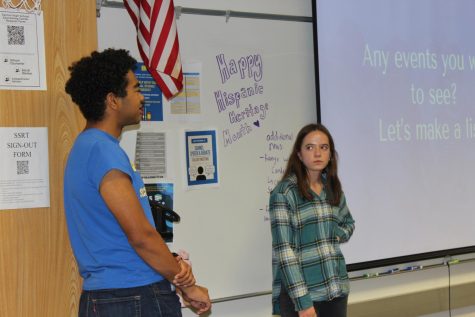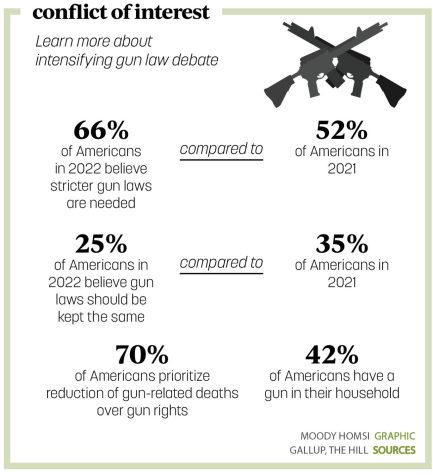Your donation will support the student journalists of Carmel High School - IN. Your contribution will allow us to purchase equipment and cover our annual website hosting costs.
With political polarization increasing, students, teachers work to combat biases, improve governmental education
February 7, 2023
In Indiana, all high school students are required to participate in a government or civics class in order to graduate.
According to social studies teacher Mickey O’Toole, this requirement is one of the most important parts of a young person’s education.
“Regardless of your political affiliations or what you want to do for your career, politics and the government will have some degree of influence over every part of your life,” he said. “We love to complain as a society, but don’t actually understand how the government works. (Complaining is) all it is. Not actually any kind of solutions, or there’s no meaningful conversation.”
Governmental conversation, as O’Toole mentions, is frequently attributed to arguments over leadership such as the effectiveness of a president or representative.
Jan. 20 marked two years since President Joe Biden was inaugurated into office, and on Feb. 7, he will address the nation with his State of the Union Address discussing events and changes under his leadership.
This speech, like all other major political events, will be covered by news companies and political commentators as individuals review the government’s work in the past year. However, this year’s commentary may be more polarizing than previous presidential reflections.
According to the Pew Research Center, since the 2016 election, approximately 10 to 20% more people associated with both Republican and Democratic parties are more likely to call members of their politically opposing party “immoral,” “close-minded,” “dishonest,” “unintelligent,” “lazy” or multiple combinations of these terms.This increase in aggressive thinking has led to increased political polarization, which many researchers have attributed to social media echo chambers and party-based stereotyping.

Students at this school are working hard to combat these challenges. For example, Becca Howard, CHS Democrats vice-president and sophomore, said she thinks people should engage more in inter-party conversations and learn more about pressing political topics to reduce these biases.
“When we find out that someone thinks or feels differently than us on an important issue, we form an opinion or stereotype around them, and oftentimes subconsciously,” she said,“but I think judging someone based on one thing they’ve said or one thing you’ve heard about them isn’t enough to form an accurate opinion, especially before you’ve had a full conversation about it with them.”
For his part Jacob Bailey, CHS Young Republicans president, Indiana High School Republicans chairman and senior, said he also attributes frequent conversation to a more holistic understanding of politics.
“I try to expand my knowledge by really learning where (other beliefs) come from so I can find ways to improve my discourse. Those conversations allow me to understand (other experiences and) reform my political views so I can have an actual conversation rather than the toxic political discourse that we’re seeing (represented in media),” Bailey said. “If you never get the chance to talk one-on-one with a person and (truly) see them as a person, then you can never humanize other political beliefs.”
On a larger scale Howard said she thinks schools should encourage students to be involved in their community more than they presently do.
“We’re the next generation of voters and the decisions we make will all be rooted in our education,” Howard said. “Whether it’s sending out information about registering to vote or simply teaching what is expected of a U.S. citizen, I think there is always more schools could be doing in civic education.”
O’Toole said his primary goal as a government teacher is to help students understand the importance of being an engaged citizen.
“It’s important to challenge students so they get to really think, ‘Why do I believe what I believe?’ ‘Have I just been repeating what others say?’ and ‘How do I know what’s really important to me?’” he said. “Hopefully I’m giving them the tools to understand and bolster their understanding of these ideas.”
Sophomore Angelina Liu said after not caring about politics for most of her life, she said she is now beginning to see the value of political discussion.
“I used to hate politics, but now that I’m getting older and I’m seeing the importance of them I’m trying to keep up with them more,” she said. “Especially with ( the recent decision to overturn)Roe vs Wade and seeing how (governmental issues) affect me, I’m trying to keep up with it now more.”
According to an August 2022 Pew Research study, a vast majority of politically-affiliated adults claim a major reason they chose their affiliation is the policies they value and viewing the opposing party’s policies as harmful, but Bailey said he thinks this bias damages both sides of the political spectrum.
“I think that this idea that if you vote Democrat you’re a leftist, and if you vote Republican then you’re an alt-right member is just trying to incite violence and incite hateful discourse between the two factions, and it’s just simply not true,” Bailey said. “With echo chambers, people demonize the other view from their politics without understanding that you may not support the alt-right, socialism or communism. (Echo chambers) use aggressive terms that turn opposing views into an enemy (rather than a partner) plaguing the importance of discourse (in politics as a whole)”

Regarding political debates as a whole, Anushka Pandey, Carmel Debate president and senior, said people should stop viewing politics as a debate. She said she thinks classroom discussions about policies and historical viewpoints help people gain perspective in civics and develop their individual political beliefs and values.
“(When discussing politics in class) ,your teacher is supposed to be non-partisan and not getting directly involved, and I think that can help as, like, a mediator. A lot of the issues we talk about are either so far in history that they have to be black and white like slavery, and we’re not debating Hitler, we shouldn’t be, In my experience of allowing both sides to exist and actually talking about why those sides exist (helps with mitigating political differences).”
Howard said that even though some people understand politics, many people choose to not engage with it for different reasons. She suggested reasons such as students feeling too young to make a difference and distaste for the climate of current political activism. However, Howard said political apathy as a whole can lead to people being less engaged as an adult.
“I think that even if you don’t feel pressed to engage in activism or even form opinions yet, it is still important to start the process of educating yourself on some political issues at a young age so when it is time for you to form an opinion and vote, you will have had time to think about it and will be confident in the people you vote for,” she said.
Bailey said he also encourages students to do research beyond what people in their community frequently discuss in order to holistically understand the role of government in their lives.
“It’s tedious trying to educate people on that without it having some sort of skew or bias towards a certain viewpoint, but I think it’s important to have students educated on current events and allow them to really take in this knowledge beyond just what a book says,” he said. “You can memorize the Constitution, but if you don’t understand what’s going on in the world around you, then you’re not really going to have a good viewpoint on government, politics or the way that we deal with prominent issues nowadays.”
O’Toole said one of the best ways to improve the current political divide is to encourage a better understanding of government and to expand government education as a whole.
“I think we should have students be learning about how our government works from eighth grade up,” O’Toole said. “We demand things like four years of math and science, and while subjects shouldn’t be pitted against each other, in order to survive in a society or be a functioning human being at all, you need to understand (the) government.”